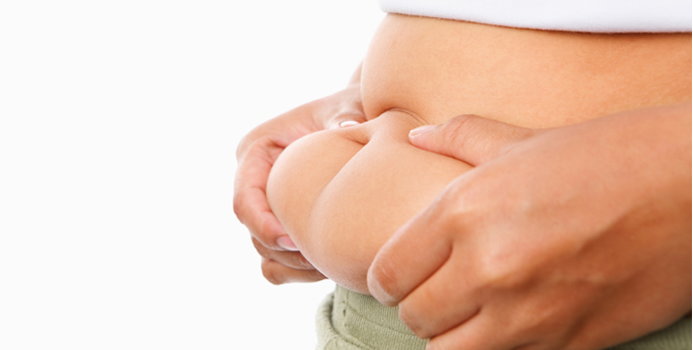Fact: It is harder to lose that unwanted belly fat as individuals age. The main reason for the increase in body fat is a decrease in metabolism. Research has shown that most people's metabolisms decrease one half of one percent per year after the age of 25. The three main physiological factors that slow down a person's metabolism are: decrease in muscle mass, change in hormone levels and decreased caloric need of internal organs. All three of these factors can be controlled by making lifestyle changes. The one that is the most controllable is the decrease in muscle mass.
Changes in hormone levels usually occur in the body due to a decreased secretion of a hormone by a gland or the body's cells become unable to use the hormone as effectively. For women, the largest change in hormone levels comes when menopause occurs. This is when many women will start to notice a change in their body composition and get the so-called "muffin top." Menopause is not something that can be avoided but there are ways to make lifestyle changes to off set some of the body compositions that come with it. Increasing aerobic exercise will help to burn more calories, which will aid in weight maintenance and reduce some of the uncomfortable symptoms of menopause. Starting a resistance training program to increase muscle mass will help alleviate some of the symptoms that occur as hormones change with age.
The decrease in calorie needs of internal organs occurs because they are functioning more efficiently. This gradual decrease in calorie needs happens as the body ages. Again this cannot be stopped but the decrease can be slowed. Think of the heart as an example. It is the same as any of our other muscles; if it has to work harder it becomes stronger, if it works too hard it becomes fatigued and damaged, and if it does not work as hard it tends to become weaker. Finding the fine line of too much work and too little is necessary to keep this organ functioning. One of the best ways to add the right amount of stress is cardiovascular activity such as walking, biking, running or swimming. The heart is only an example but all other internal organs benefit from exercise since it helps increase blood flow and adds a positive stress to the body.
The most controllable factor out of the three is the decrease in muscle mass. Probably the most obvious intervention is to maintain and increase muscle mass with resistance training. The more that muscle mass is maintained during the aging process the better the body's metabolism. Resistance training does not mean heading to the local gym and trying to bulk up like the muscle guys on the magazines. It means challenging the muscles to do more work by lifting a weight. This can be done by using everyday household items like water jugs or canned goods and lifting them multiple times. For more information on strength training exercises and aging a great resource is President's Council on Fitness, Sports and Nutrition.
Grete R. Hornstrom is a Clinical Dietitian who is currently specializing in pediatric care. She holds a Bachelors of Science in Physical Education with a concentration in Exercise Science from Kent State University, a Master of Arts in Wellness Management from Ball State University, and a Master of Science in Dietetics from Ball State University. She has worked with overweight children and adults, recreational and elite athletes, chronically ill children, and every day people on developing nutrition plans and healthy lifestyle changes. In addition she has worked with recreational teams, high school teams, and college teams educating them on the importance of nutrition and performance. She has completed one marathon and three half marathons in the last two years. Her newest sport of choice is cycling.



